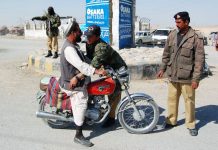
Bannu: Crackdowns on Afghan refugees continue in Bannu as elsewhere in the Khyber Pakhtunkhwa province. In an operation on Monday, police arrested more than 50 Afghan refugees during raids on various spots like markets, refugee camps and urban areas.
Khyber Pakhtunkhwa and Balochistan, both provinces bordering Afghanistan, host most of the 1.5 million registered Afghan refugees in camps, refugee settlements and urban areas.
The action against refugees was taken by the provincial government of the Khyber Pakhtunkhwa (KP) in the backdrop of the Peshawar tragedy at the Army Public School where terrorists killed 140 students on December 16, 2014.
The crackdown has continued in the entire province of KP against illegal, unregistered Afghan refugees. Hundreds of them have been put behind bars since the KP government launched operation against unregistered Afghan refugees.
In Bannu, the arrested Afghan refugees were kept in two small rooms in the city police station where they could be seen sitting or standing side by side.
“We have legal documents with us and our cards are valid till Dec 2015 but the police arrested us to extort money from us,” said Karim Shah Afghani, a detainee in the jail of the City Police Station. He said they were taken into custody illegally.
Shah, who hails from Takhar province of Afghanistan, claimed he had the original Proof of Registration (PoR) card issued by the National Database Registration Authority of Pakistan.
“I have renewed it twice since 2005 and I am a legal refugee living here peacefully running my own business in Bannu city,” he said. “I don’t know why the police is harassing me.”
Many other Afghans complained about the police action saying they were detained illegally.
“I have lived here for the last 25 years and consider this country as my own but the police harasses us from time to time,” said Abdul Haq, 29, an Afghan who runs a fabrics’ business in the famous tea-market of Bannu city.
Gul Hameed, a police officer at the City Police Station, said the Afghans were taken into custody following the directions of KP Government. He said the action was taken to ensure law and order in the city where a large number of internally displaced people from the neighboring North Waziristan Agency have sought refuge after a military operation against terrorists there.
“We will produce them before the magistrate and those who have valid refugee cards will be released on the bail of a local guarantor,” said Gul. He said those without valid cards would be handed over to relevant authorities who would deport them to Afghanistan.
Gul told News Lens that some of the arrested refugees were involved in serious crimes like kidnapping for ransom, killings, extortion, theft and drug-dealing.
An employee of the intelligence branch of the police, who is not authorized to speak to media, told News Lens on condition of anonymity that the Afghan refugees were arrested under clause 14 of the foreign act of Pakistan.
“We cannot offer any concession as we face the worst kind of law and order situation in the province,” he said. “We have to follow the command by high ups.”
Ehsanullah, an official of United Nations High Commissioner for Refugees (UNHCR), told News Lens Pakistan at present 4 million Afghans are living in Pakistan and 2.5 million of them are based in KP while the remaining 1.5 million are settled in other parts of Pakistan like Karachi, Mianwali and Islamabad etc.
“They are given legal asylum under a tripartite contract between Pakistan, Afghanistan and UNHCR in 2005 wherein these refugees would have computerized Proof of Registration (PoR) cards,” Ehsan said. He said those who had PoR cards would be considered as legal and those without the proof card would be illegal immigrants in the country.
He said about 3005 families (15200 individuals) resided in Bannu city and the adjacent areas in various camps set up for Afghan refugees.
“Legal refugees would be given legal support and can live here till the expiry of their PoR cards,” Ehsan explained, adding that if they wanted to leave for Afghanistan, they would be assisted with a repatriation package. The illegal refugees would get nothing.
Afghan refugees in Bannu city and surrounding areas run small businesses or work as daily wage laborers.
Muhammad Khan Bajouri, a shopkeeper in Bannu city, said the local population would certainly benefit if the Afghans leave because they would enter businesses and jobs left by the refugees.
“Here in this market only ten shops belong to the locals while the rest of the market is occupied by the Afghans,” he said.
Khan said as soon as the Afghans leave, the rents of the shops and markets would come down automatically.
“They [the Afghans] are more business minded and they pay high rents as compared to the locals,” said Khan.
A local official of the civil administration told News Lens on condition of anonymity that the decision to round up Afghans was taken solely by the KP government. The federal government was not in favor of it, he said.
“As the federal government has entered into a (tripartite) treaty with the UNHCR, there is a clash between the federal and provincial authorities over the decision of the KP government to crackdown on Afghan refugees,” said the official.



